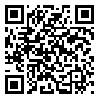Volume 25, Issue 5 (8-2018)
RJMS 2018, 25(5): 29-37 |
Back to browse issues page
, kamran6@hotmail.fr
Abstract: (4910 Views)
Background: Regarding the prevalence of obsessive-compulsive disorder of all ages and its adverse effects in childhood and adolescence, it is absolutely necessary to review and evaluate new therapies with low complications and appropriate treatment effects. The purpose of the present study was to determine the effectiveness of cognitive rehabilitation on improving the auditory and visual working memory secondary school girl adolescents with obsessive-compulsive disorder.
Methods: The present study was a semi experimental design with pretest-posttest design with control group. The population of the study included all girls suffering from obsessive-compulsive disorder in Koohdasht high schools in the academic year of 2011-2012. By random selection of four high schools and screening using Fava et al., A compulsory obsessive-compulsive inventory questionnaire, after interviewing them, 30 students who were selected to meet the criteria for entering and leaving the research were purposefully selected and they were randomly assigned to two groups. From both groups, Wechsler's active memory test was performed and a cognitive rehabilitation program was performed for the experimental group individually for 12 sessions.
Results: After intervention, cognitive rehabilitation, auditory active memory (p<0.001) and active activity memory (p<0.001) increased in experimental group compared to control group.
Conclusion: The results of this study showed that cognitive rehabilitation is effective in improving the working memory of patients with OCD. Therefore, it is suggested that, in addition to psychological interventions, cognitive rehabilitation interventions should be used as an integrated, applied and supportive therapeutic approach along with psychotherapy by specialists in this field.
Methods: The present study was a semi experimental design with pretest-posttest design with control group. The population of the study included all girls suffering from obsessive-compulsive disorder in Koohdasht high schools in the academic year of 2011-2012. By random selection of four high schools and screening using Fava et al., A compulsory obsessive-compulsive inventory questionnaire, after interviewing them, 30 students who were selected to meet the criteria for entering and leaving the research were purposefully selected and they were randomly assigned to two groups. From both groups, Wechsler's active memory test was performed and a cognitive rehabilitation program was performed for the experimental group individually for 12 sessions.
Results: After intervention, cognitive rehabilitation, auditory active memory (p<0.001) and active activity memory (p<0.001) increased in experimental group compared to control group.
Conclusion: The results of this study showed that cognitive rehabilitation is effective in improving the working memory of patients with OCD. Therefore, it is suggested that, in addition to psychological interventions, cognitive rehabilitation interventions should be used as an integrated, applied and supportive therapeutic approach along with psychotherapy by specialists in this field.
Keywords: Cognitive rehabilitation, Obsessive-compulsive disorder, Visual and audible working memory
Type of Study: Research |
Subject:
Clinical Psychiatry




